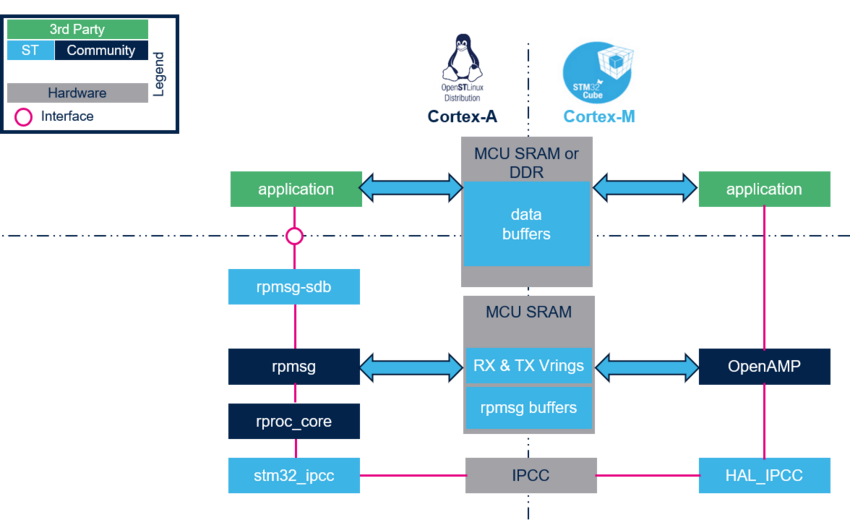1. Introduction[edit source]
As explained in "Exchanging_buffers_with_the_coprocessor", the RPMsg protocol may be not efficient enough to directly exchange large buffers between the Cortexes. In this case implementing the indirect buffer exchange mode is recommended:
- allocate contiguous buffers to store the data to exchange
- use RPMsg to exchange references to these buffers with the remote processor.
This article gives an example mechanism that can be implemented to exchange indirect buffers between a main processor and a coprocessor.
2. Architecture overview[edit source]
This architecture example relies on the rpmsg_sdb linux driver.

- On Cortex-A:
- The rpmsg_sdb Linux driver implements the service to allocate and share buffers with the Cortex-M.
- The Linux application requests and memory-maps (mmap) the buffers needed to access the associated memory.
- On Cortex-M:
- The application has to implement the "rpmsg-sdb-channel" RPMsg service to manage the buffer information.
- A DMA can be used to transfer data to/from DDR.
Refer to How to exchange large data buffers with the coprocessor - example for an example.
3. rpmsg_sdb driver[edit source]
The RPMsg shared data buffer driver example is in charge of:
- Allocating large buffers in contiguous memory (DDR) and memory mapping them (mmap) for use by an application.
- implementing the RPMsg service to share buffer information (address, size) with the coprocessor.
- Sending events to a Linux application (relying on the eventfd interface) when buffers are available (on RPMsg message reception).
3.1. Configuration[edit source]
3.1.1. Kernel configuration[edit source]
No kernel configuration is needed. The rpmsg_sdb Linux driver is proposed as module and can be installed using the associated Yocto recipe.
3.1.2. Device tree[edit source]
No device tree declaration is needed. The rpmsg_sdb driver is registered as an RPMsg driver. it is probed when the remote processor creates the "rpmsg-sdb-channel" service.
3.1.3. Source code[edit source]
The source code is available in the rpsmg-sdb-mod Yocto recipe.
3.2. How to use[edit source]
3.2.1. User space interface[edit source]
The rpmsg_sdb driver exposes a "/dev/rpmsg_sdb" sysfs that offers an interface to allocate and manage the shared buffers.
- open/close: get/release file descriptor.
int fd;
fd= open('/dev/rpmsg_sdb');
close(fd);
- mmap: allocate and map memories
void *buff0_id, *buff1_id;
buff0_id = mmap(NULL, size, PROT_READ | PROT_WRITE, MAP_PRIVATE, fd, 0);
buff1_id = mmap(NULL, size, PROT_READ | PROT_WRITE, MAP_PRIVATE, fd, 0);
- RPMSG_SDB_IOCTL_SET_EFD ioctl: register event for a buffer
typedef struct
{
int bufferId, eventfd;
} rpmsg_sdb_ioctl_set_efd;
int efd[NB_BUF];
rpmsg_sdb_ioctl_set_efd q_set_efd;
for (i=0;i<NB_BUF;i++){
/* Create the evenfd, and sent it to kernel driver, for notification of buffer full */
efd[i] = eventfd(0, 0);
}
q_set_efd.bufferId = i; /* i is the index of the buffer */
q_set_efd.eventfd = efd[i];
ioctl(fd, RPMSG_SDB_IOCTL_SET_EFD, buff0_id, &q_set_efd);
- RPMSG_SDB_IOCTL_GET_DATA_SIZE ioctl : get the size of a buffer
typedef struct
{
int bufferId;
uint32_t size;
} rpmsg_sdb_ioctl_get_data_size;
rpmsg_sdb_ioctl_get_data_size q_get_data_size;
ioctl(fd, RPMSG_SDB_IOCTL_GET_DATA_SIZE, buff0_id, eventfd);
p*manage event
while (1) {
ret = poll(fds, NB_BUF, TIMEOUT * 1000);
if (ret < 0) {
perror("poll()");
break;
} else if (ret) {
printf("Data is available now.\n");
} else if (ret == 0) {
printf("No data within five seconds.\n");
break;
}
for (j=0;j<NB_BUF;j++){
if (fds[j].revents & POLLIN) {
/* Event received for the buffer j: New data is available for buffer j */
}
}
}
3.2.2. RPMsg messaging[edit source]
The RPMsg protocol is used for communication with the Cortex-M:
- Information about the buffer allocated and mmaped is sent to the Cortex-M.
- The message is structured in a string with following format: "BxAyyyyyyyyLzzzzzzzz"
- x: buffer index (32 bits, decimal format, no leading zero)
- yyyyyyyy: physical address of the buffer in DDR (32 bits, 8-digit hexadecimal format, leading zero)
- zzzzzzzz: length of the buffer (32 bits, 8-digit hexadecimal format, leading zero).
- Buffer filled event received from the Cortex-M:
- When the Cortex-M4 has filled a buffer it can inform the Linux application by sending an RPMsg with following string format : "BxLzzzzzzzz"'.
- x: buffer index (32 bits, decimal format, no leading zero)
- zzzzzzzz: length of the buffer (32 bits, 8-digit hexadecimal format, leading zero).
- On reception of this message the rpmsg_sdb driver sends an event to the application.